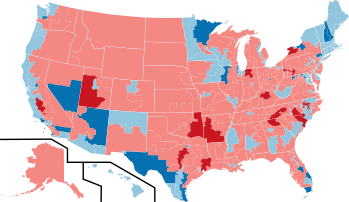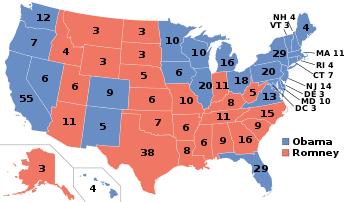United States elections, 2012
| Presidential election year | |
| Election day | November 6 |
|---|---|
| Presidential election | |
| Electoral vote | |
| Barack Obama (D) | 332 |
| Mitt Romney (R) | 206 |
| Presidential election results map. Blue denotes states/districts won by Democrat Barack Obama, and Red denotes those won by Republican Mitt Romney. Numbers indicate electoral votes allotted to the winner of each state. | |
| Senate elections | |
| Seats contested | 33 seats of Class I |
| Net change | Democrats +2 (Democrats retain control) |
 |
|
| 2012 Senate election results map | |
| House elections | |
| Seats contested | All 435 seats |
| Net change | Democrats +8 (Republicans retain control) |
 |
|
| 2012 House election results map | |
| Gubernatorial elections | |
| Seats contested | 14 (12 states, 2 territories) (including a recall election in Wisconsin) |
| Net change | Republican +1 |
 |
|
| 2012 Gubernatorial election results map | |
| Legend | |
|
Democratic hold
Democratic pickup
Republican pickup
Recall Against Republican
(Republican Hold)
Republican hold
Independent hold
Independent pickup
|
|
The 2012 United States elections included many federal elections on Election Day, November 6, 2012, most prominently the 57th presidential election, Senate elections (where 33 seats were decided), and House of Representatives elections (to elect all 435 members of the House for the 113th United States Congress). It also featured 13 state and territorial governors' races; state and territorial legislature races, special elections, and various other state, territorial, and local races and referenda on votes held in November as well as throughout the year.
Little overall change occurred on the Federal level. Incumbent President Barack Obama was elected to a second term, with the national popular vote percentage being 51.1% to 47.2%, and the Electoral College vote being 332 to 206, for Obama and challenger Mitt Romney, respectively. The Democratic Party held control of the Senate and the Republican Party maintained a majority in the House of Representatives. Republicans also held on to a majority of governorships.
The election resulted in New Hampshire being the first state with an entirely female congressional delegation and with Wisconsin electing the first openly LGBT member of the Senate. Three state referenda passed legalizing same-sex marriage, while Minnesota became the first state in history to reject a proposed state-level constitutional ban of same sex marriage. Two states approved and one rejected the legalization of recreational marijuana, and one more state voted to approve allowing marijuana for medical use. A referendum was also held in Puerto Rico regarding the future political status of the U.S. unincorporated territory, with voters agreeing towards acquiring statehood.
...
Wikipedia


